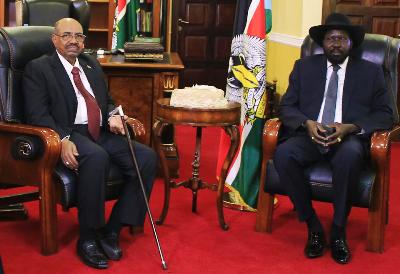Khartoum, Juba deny deployment of joint force to protect oil fields
January 7, 2014 (KHARTOUM/JUBA) – Sudanese and South Sudanese governments denied on Tuesday reports that presidents Omer Al-Bashir and Salva Kiir a struck a security deal to deploy joint forces to protect oil areas in South Sudan.

Sudanese foreign ministry spokesperson, Abu Bakr Mohamed Al-Amin denied reports about the security deal, stressing that there had been a misunderstanding or miscommunication that led to attribute the alleged statements of the minister Karti.
Al-Amin in a press conference held at the premises of the foreign ministry pointed out that Karti spoke about two matters the first an agreement to send 900 oil workers when Juba give the green light and the second is to implement the cooperation agreements between the two courtiers.
“There is a joint keenness to implement those agreements, including the demarcation of the border, and completion of the zero line which determines the baseline for the demilitarised security zone between the countries”, added the spokesperson.
He went further to say that Bashir in his meeting with Kiir and during the joint press conference in Juba spoke about Sudan’s good experience to secure the common border with a number of neighbouring countries like, Chad, Eritrea and Ethiopia through joint patrols.
Bashir also pointed out that similar forces can be formed to secure the border with South Sudan at the end of the current exceptional circumstances, Al-Amin said.
“However there was no talk of sending joint troops to guard, protect or secure the oil fields within the borders of the State of South Sudan”, he emphasised.
The joint security committee during its fifth meeting held in Khartoum on 25-26 November did not reach an agreement over the identification of the zero line as the two sides failed to determine the surface of a disputed area called 14 Mile located between Northern Bahr el Ghazal and East Darfur states.
In Juba, South Sudanese oil minister, Stephen Dhieu Dau, told Sudan Tribune on Tuesday that he was “not aware” of any security deal with Khartoum to protect oil fields.
“There was no such agreement that I know”, Dau said on Tuesday.
President Kiir’s spokesperson, Ateny Wek Ateny, also told Sudan Tribune that “there was no agreement on joint forces” to protect South Sudan’s oil fields, most of which lie in Upper Nile states near the northern border with Sudan.
The current crisis in South Sudan began when fighting between members of SPLA broke out in Juba on December 15, 2013 following weeks of political tension within South Sudan’s ruling party. The conflict in the capital lasted only a few days but led to large scale rebellions in Jonglei, Unity and Upper Nile.
Former vice-president and rebel leader Riek Machar whose partisans control Unity state and shutdown oil facilities there threatened also to stop oil production in the Upper Nile where the South Sudanese army control and protect oil facilities.
In a press conference after their meeting in Juba both Bashir and Kiir both reaffirmed their commitment to not support rebel groups from both sides.
“The two presidents had only reiterated their commitments not support rebels”, Ateny reiterated on Tuesday.
The South Sudanese foreign minister, Barnaba Marial Benjamin is expected to arrive in Khartoum on Wednesday to finalise some issues agreed by the two presidents.
Since last September the foreign ministers in the two Sudans are tasked with the follow-up of implementation process of the cooperation agreements.
Commenting on Benjamin’s visit to Khartoum, the Sudanese foreign ministry spokesperson said the visiting minister will discuss a report on the implementation of cooperation agreements to be submitted soon to a joint committee headed by the Sudanese and South Sudanese vice-presidents.
(ST)
